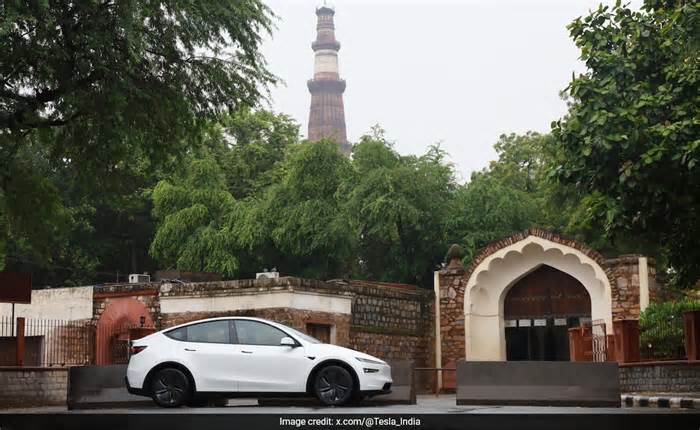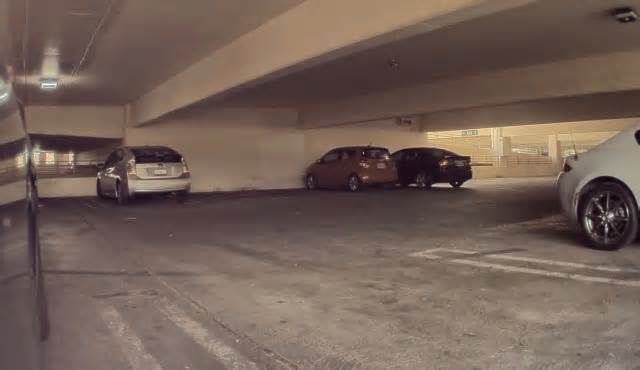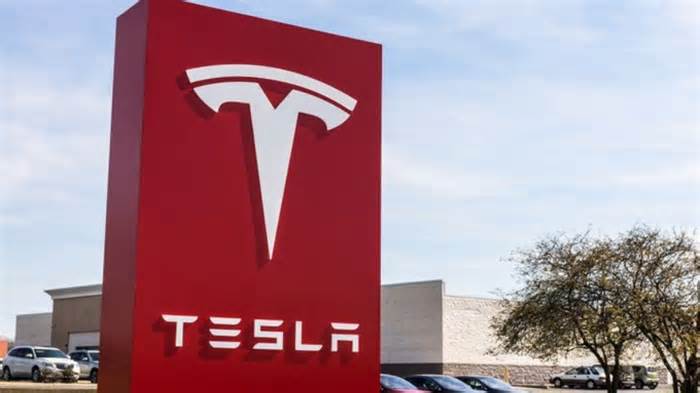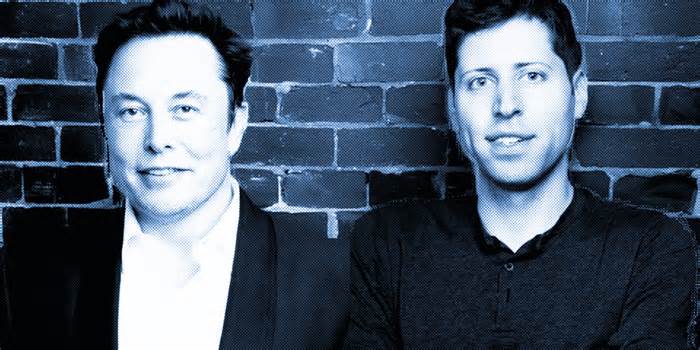
Elon Musk’s Boring Company is tunneling beneath Las Vegas with little ...
- by Las Vegas Review-Journal
- Jan 08, 2025
- 0 Comments
- 0 Likes Flag 0 Of 5

January 8, 2025 - 9:59 am
Musk, who spent more than $250 million to help elect Trump, is now leading the president-elect’s Department of Government Efficiency taskforce, recommending cuts to the federal bureaucracy and its ability to regulate. And Boring Company CEO Steve Davis is helping recruit staff for the initiative.
Given Musk’s role advising Trump on ways to slash regulations and government oversight, Boring and the Vegas Loop might be a harbinger for the country.
“A Real Get-It-Done State”
In 2014, Musk stood on the steps of the Nevada Capitol with a man named Steve Hill, who was heading the Governor’s Office of Economic Development. They were celebrating a deal to build a Tesla Gigafactory outside Reno.
Hill, as the state’s negotiator, had worked feverishly on the agreement, which provided $1.25 billion in tax incentives to Tesla. Musk would later praise Nevada as “a real get-it-done state.”
Soon after the battery factory opened in 2016, Musk’s Boring Company was looking for a place to build a project testing its solution to urban congestion, an idea that sprang from Musk’s frustration with LA traffic. Leaders at the city of Los Angeles were interested. A regional transportation authority, Metro, has a say on public transit in the city, and California law requires an environmental review. But Boring and the city tried to sidestep the state law, claiming an exemption for building in urban areas.
Residents, however, weren’t as eager to turn Boring loose. When neighborhood groups in West LA sued the city over the lack of environmental review, Boring settled with them and looked to build elsewhere.
Musk has frequently railed against government scrutiny of his other companies, Tesla and SpaceX, and claims excessive government oversight has made it nearly impossible to build big projects in parts of the country.
“Environmental regulations are, in my view, largely terrible,” he said at an event with the libertarian Cato Institute in June. “You have to get permission in advance, as opposed to paying a penalty if you do something wrong, which I think would be much more effective. To say, ‘Look we’re going to do this project; if something goes wrong we’ll be forced to pay a penalty.’ But we do not need to go through a three- or four-year environmental approval process.”
Everywhere Boring tried, it struggled to start digging. In Chicago, where then-Mayor Rahm Emmanuel was a supporter, local leaders expressed skepticism about whether Boring could build an airport loop without public funding. In Maryland, where Boring and federal officials completed a draft environmental review in 2019 for a high-speed link between Baltimore and Washington, the company never started tunneling.
That was, until it got to Las Vegas.
In 2018, an executive who’d met Hill during the Tesla Gigafactory negotiations called him to discuss potentially bringing Boring to Las Vegas, Hill said. (Hill said Musk himself had previously pitched Hill on a Boring Company project in Northern Nevada.) Hill, now a leader at the convention authority in Las Vegas, was in a position to help. Funded by about $460 million in annual revenue from hotel room taxes and conventions, the authority is a force in local politics, channeling the influence of the gaming and tourism industry.
The authority happened to be looking to build a people-mover to link exhibit halls at the 4.6 million-square-foot Las Vegas Convention Center. Hill said he already had a sense that the Boring Company’s concept “would work pretty well here.” Nine companies submitted bids, and two were finalists. Boring’s bid was about a third of the cost of the other credible proposals, Hill said. A week before the board was to select the winner, Hill called a news conference and announced the Boring partnership. He pointed to a map of a tunnel system extending far beyond the convention center — to the airport and toward Los Angeles.
The authority boasted that news coverage of its Boring partnership was picked up by 1,200 outlets, providing $1.3 million in free publicity for Las Vegas.
The Regional Transportation Commission of Southern Nevada is the planning agency for the Las Vegas metropolitan area, overseen by local elected officials. But because Boring’s project started so small and didn’t use federal funding, the commission wouldn’t have a say. The convention authority’s governing board, which focuses more on supporting tourism than transportation for local residents, took the lead. Nearly half of the authority’s 14-member board represents private interests, primarily the gaming industry. Goodman and two others voted against the partnership.
To fund the convention center loop, the authority committed $52.5 million in bonds that will be paid back by the agency. Since it opened in April 2021, Hill said the authority has paid Boring about $4.5 million a year to operate the convention center loop, which provides free rides to conventioneers. The authority also spent $24.5 million to purchase the Las Vegas Monorail out of bankruptcy, giving Boring the right to tunnel in the monorail’s noncompete territory.
Hill has repeatedly claimed, to elected officials, to local environmentalists and in an interview with ProPublica and City Cast Las Vegas, that the loop is the only viable way for Las Vegas to address its traffic congestion. “It’s not really a debate. There’s no reason to explore the other options,” he told members of the Sierra Club during a meeting to discuss public transit, according to Vinny Spotleson, volunteer chair of the environmental group’s regional chapter.
Hill acknowledged to ProPublica and City Cast, however, “that’s a prediction. That’s not a mandate. I don’t have the standing to make that decision. I think people listen to what I have to say periodically.”
The Clark County Commission — which governs the Las Vegas Strip and surrounding areas — was listening when, just a few months after the convention center loop opened, Hill told them that Boring had already proven “how great a system this is, that it can be done, and I think provided confidence for this community to move forward.”
At the urging of Hill, casino executives and labor union leaders, the County Commission approved a 50-year agreement giving Boring the right to operate a “monorail” above and below ground on county property. The 2021 vote was unanimous.
In Las Vegas, Boring had achieved what it could not in Maryland, Chicago or LA.
“All of their company, it seemed like, was dependent on Vegas working out,” said Spotleson, who first met company representatives around 2019 when he was district director for U.S. Rep. Dina Titus, D-Las Vegas. “That we were the test case that they wanted to take to the Chicagos and Bostons and other cities of the world and say, ‘Look at what we did in Vegas. We can do that here.’”
An Expanding System
The Boring Company has completed more than 5 miles of the 68-mile system. Despite the proposal’s massive scale, it has been approved with little public input.
When the County Commission considered the expansion plans, they were listed on agendas under the obscure names of limited-liability companies, making it difficult for anyone but the company and its supporters to track. For example, the county approved a roughly 25-mile expansion and 18 new stations at a 2023 zoning meeting through a notice that gave no indication it was related to the Vegas Loop: UC-23-0126-HCI-CERBERUS 160 EAST FLAMINGO HOTEL OWNER L P, ET AL. In 2021, the commission approved an extension for Caesars Entertainment hotels under the name UC-20-0547-CLAUDINE PROPCO, LLC, ET AL, and about 29 miles of tunnel under UC-20-0547-CIRCUS CIRCUS LV, LLC, ET AL.
Clark County and the City of Las Vegas approved 68 miles of tunnels between 2019 and 2024. In nearly six years, the company has built about 5 miles of tunnels, with even fewer miles in use. The Boring Company does not make available geographic data about its system. Maps were created based on publicly available reports. Locations may not be exact. (Lucas Waldron/ProPublica)
Boring uses a machine known as Prufrock to excavate its 12-foot-in-diameter tunnels, applying chemical accelerants during the construction process. For each foot the company bores, it removes about 6 cubic yards of soil and any groundwater it encounters, according to a company document prepared for state environmental officials. It is required to obtain permits to ensure the waste does not contaminate the environment or local water sources.
Public records — including emails, notices, photos and videos, and other documentation — obtained from Clark County, the Clark County Water Reclamation District and Nevada Division of Environmental Protection through public records requests show the company has been less than meticulous in handling the waste.
In June, an employee with the county road division tailed a Boring Company truck that spilled mud onto city streets, according to the records. The trucks “have no marking and no license plates,” wrote Dean Mosher, assistant manager for the roads division. A truck route that the company had reported to the county must have been “totally false,” Mosher concluded.
A few months later, a truck hauling waste from the project spilled gravel, rock and sand onto Interstate 15, slowing traffic for more than four hours during rush hour. The driver was fined $75 for an unsafe or unsecured load, according to court records.
Last year, without the county’s knowledge, a Boring contractor relied on a permit held by a county contractor to store muck near apartment buildings and the Commercial Center shopping plaza, along one of the busiest thoroughfares in central Las Vegas, a county spokesperson said. The county fined the contractor $1,549. A county spokesperson would not disclose other locations where the company stores waste and directed “operational questions” to the company.
Photos taken by a Clark County official show a truck hauling waste from a Boring Company worksite on June 6, 2024. The official observed mud spilling from the vehicle. The photos were obtained through a public records request. (Clark County Road Division)
Boring must also remove groundwater as it digs — including near an area where the aquifer is polluted with a dry cleaning chemical known as tetrachlorethylene, or PCE, which can be toxic in large amounts. Boring is required to filter the water before discharging it into storm drains, which flow to Lake Mead. But regulators documented cases where Boring had started work without permits or bypassed their water treatment system, government records show.
In 2019, the company discharged groundwater into storm drains without a permit, resulting in a state settlement and a $90,000 fine. In 2021, state officials sent a cease-and-desist letter to prevent Boring from taking actions that could “cause unpermitted discharge of groundwater,” prompting Davis, Boring’s CEO, to complain to the head of the Nevada Division of Environmental Protection that the state was “being fairly aggressive and that this was starting to hurt” the company, according to an email the head of the agency sent to several staffers.
The following year, local officials cited Boring for illegally connecting to a sewer without approval, records show. In 2023, state environmental regulators found the company was dumping untreated groundwater into the sewer, with one official writing that Boring staff were “unsure of how long they have been bypassing the treatment system.” Local officials said they investigated but did not find evidence to take further action.
That year, Boring tunneled without permits required to work in public rights of way, prompting the Public Works director, Cederburg, to note, “They are in violation of the franchise agreement,” records show. A Boring official responded that once the county notified the company of the issue, it had immediately filed the two permits. The county approved them retroactively, tacking on a $900 fee for each permit.
Untested, Unstudied, Private
On a recent Friday at a Vegas Loop station at the Resorts World hotel, an attendant directed riders to Teslas parked in a waiting area. An all-day pass to ride between the Las Vegas Strip hotel and a MagicCon event at the convention center cost $5. (Trips within the convention center are free.)
Inside the narrow tunnels, which glow green, magenta and orange, the driver navigated shoulderless roadways at 35 mph, which felt fast. At the first convention center stop, the driver halted, and three additional riders squeezed into the five-passenger sedan before the trip continued.
Boring says its system will be able to move 90,000 passengers an hour, more than a typical day’s subway ridership in 2023 at New York City’s third-busiest station, 34th Street-Herald Square Station (72,890). It’s also significantly more than Las Vegas’ monorail (3,400 per hour) and its regional bus system (7,500 per hour), according to Hill.
About a dozen Sierra Club members toured the Vegas Loop in June and were impressed, Spotleson said: no carbon emissions; neon everywhere; “It’s very Vegas.” Yet while it might be faster than walking, he said, “it just isn’t the actual mass transit solution” the city needs for its busiest places, like the airport.
The lack of alternatives has made Boring an easy sell to politicians, Spotleson said. “They understand that we need transit solutions. They’re being presented with a free option that is also carbon free. That is as simple as it gets.”
Hill acknowledged skepticism of the company’s claim that the Loop will transport up to 90,000 people an hour. “People poke at this all the time,” he said, adding that he thinks the company will be proven right. “I am completely willing to take that bet. Let’s just wait and see.”
M.J. Maynard, who leads the Regional Transportation Commission, said that because the Vegas Loop is private, her agency did not have information to evaluate Boring’s ridership claims. “As a public agency, we have to be very transparent and accountable with the [ridership] numbers that we publish,” she said. “I can’t speak to the numbers that Steve Hill or his team have posted or talked about.”
Marilyn Kirkpatrick, the only county commissioner to vote against Boring’s 2023 expansion, said she opposed giving the company permission to build beneath miles of public roads when it had completed only a small portion of the system. “Why would we give something away if we didn’t know it was going to work?” she asked.
The public might know even less about whether it’s working, thanks to removal in May of the “amusement and transportation system” permit, a designation also used for enclosed systems like the airport tram and the Strip’s High Roller Ferris wheel.
Over the past three years, county inspections of Boring’s operations under the permit identified numerous issues, including speeding drivers and an unauthorized SUV entering one of the above-ground stations. Since 2022, there have been at least 67 incidents in which the tunnel system was breached, including by outside vehicles, a skateboarder and a curious pedestrian, Fortune reported in October.
But the company convinced Clark County to remove that layer of oversight by arguing the system “did not fit squarely into the requirements” of the regulation, which “greatly complicated” matters for Boring and the county.
The company outlined an alternative oversight plan in a letter obtained by ProPublica and City Cast Las Vegas. The company will continue to submit structural, civil, fire, electrical and plumbing studies, as well as emergency plans and other planning documents, according to the letter. But Boring’s letter did not address what would replace ordinances that required multiple layers of inspection and the immediate notification of injuries and fatalities.
A Clark County spokesperson did not answer questions about potential gaps in accountability created by removal of the permit. In a statement, the county said “safety is the top priority for all county departments and agencies” as they review projects.
Kirkpatrick said she worked to include additional fire-safety and security measures in a 2021 franchise agreement, which she supported. Still, she remains concerned about Boring’s operations, including the potential for price-gouging if it becomes the “only game in town.”
In an interview with ProPublica and City Cast Las Vegas, a Nevada transportation industry expert who has closely observed the system’s development said it’s concerning that Boring’s plans, including basic transportation safety protocols, haven’t been vetted like a public project.
“What’s the traffic control system going to be like down in those tunnels? How are they going to make sure that none of those cars crash into each other when they’re going at 35 mph from one tunnel into an intersection with another tunnel?” said the expert, who requested anonymity because of concerns about professional repercussions. “All their answers are completely evasive. So there are significant operational concerns.”
Going to the Airport
Soon after the Boring Company arrived in Las Vegas, Hill approached airport leadership about connecting the Vegas Loop to the airport. The reasons are obvious. More than 50 million people landed at Harry Reid International Airport in 2023. On busy weekends, congestion at the airport can trap casino customers for almost an hour as they wait for rides.
Passengers crowd a baggage carousel at Harry Reid International Airport in October. The Boring Company hopes to eventually connect the Vegas Loop to the airport. (Madeline Carter/Las Vegas Review-Journal)
But tunneling there requires compliance with Federal Aviation Administration regulations and federal environmental reviews. For now, Boring plans to end its tunnels near the airport and use surface streets to carry passengers the last mile to the terminals, said Rosemary Vassiliadis, Clark County’s director of aviation. An airport spokesperson later clarified that no plans have been confirmed.
Using surface streets for its airport connection — at least initially — won’t alleviate gridlock like mass transit could. Vassiliadis acknowledged it won’t “give us any [traffic] relief. It’s just supplanting how people are getting here” by car, but said she supports efforts to build a more direct tunnel line to the airport.
With casino and tourism industry support — and their help paying for the project — politicians, including its most vocal critics, like Goodman, have found little reason to challenge Boring’s plans. For some, the airport factored into the decision.
When a large expansion into the city of Las Vegas came before the City Council in 2023, Goodman criticized the project as unsafe, inaccessible and inefficient, but said she would still vote in favor of it “because of the plea of the hotels and the private sector to move more and more people easily around our Southern Nevada community.”
She said she had asked the casinos and hotels if they wanted to connect to the Vegas Loop. “Every one of them said, ‘We’re scared not to, because if it succeeds and if it gets to the airport, we want to connect,’” Goodman told ProPublica and City Cast Las Vegas.
With Goodman’s vote, the council approved the extension unanimously.
Michael Squires and Anjeanette Damon contributed reporting.
ProPublica is a Pulitzer Prize-winning investigative newsroom. Sign up for The Big Story newsletter to receive stories like this one in your inbox.
Please first to comment
Related Post
Stay Connected
Tweets by elonmuskTo get the latest tweets please make sure you are logged in on X on this browser.






 Energy
Energy
















